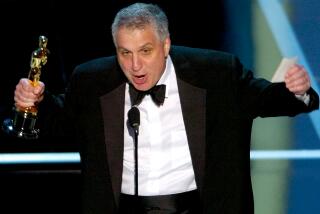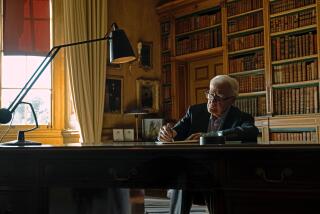In Errol Morris’ ‘The Unknown Known,’ deciphering Donald Rumsfeld
- Share via
NEW YORK — Documentarian Errol Morris has drawn some unexpected people into and around his films, and the Tuesday night premiere of his documentary “The Unknown Known” was no exception.
For one thing, the movie is about Donald H. Rumsfeld, the unapologetic neo-conservative whose politics the director has been critical of. (“Why are you talking to me?” Morris asks Rumsfeld in the movie. The former Defense secretary has no real answer.) For another, there were personalities you don’t normally find at a film premiere at the event Tuesday night: TV journalist Tom Brokaw stood up and introduced the film to an audience that included former New York City Police Commissioner Raymond Kelly
“He was not as unpopular as he later became,” Brokaw said of Rumsfeld, describing his own years in the 1970s covering Rumsfeld and the Defense Department.
PHOTOS: Behind the scenes of movies and TV
Taking the stage after the Brokaw introduction, Morris acknowledged the movie’s principal challenge.
“This has been one of the more difficult interviews I’ve ever done,” said the director, known for films such as “The Thin Blue Line” and “The Fog of War.” “I made a mistake at the outset. The mistake of thinking I might find something out. Or that there might be something to find out.” He did not appear to be joking.
Indeed, the movie, which Radius releases on April 4, centers on Morris using his patented interview techniques to try to get to the bottom of why Rumsfeld pursued such an aggressive course in Iraq. (“Obsession?” he says in the film, mirroring Morris’ words and disagreeing with them. “Measured.”) Amid exegeses of Rumsfeld’s famed “snowflakes” — the memos he blizzarded on his staff — Morris puts the former Defense secretary on the hot seat in a manner similar to his questioning of former Defense Secretary Robert S. McNamara in “The Fog of War.”
But unlike McNamara, the subject here offers little explanation for why he took the tacks he did, instead offering just a general insistence that he acted on the intelligence and instincts he thought right at the time. He maintains to Morris that the filmmaker is “chasing the wrong rabbit,” insinuating that he’s not at fault for the debacles in Iraq.
RELATED: Movie reviews by The Times
After the screening, Morris took to the stage again to shed some light on what he believed was going on in Rumsfeld’s mind.
“The theme that runs through everything is a strange kind of cluelessness. I don’t know how to describe it,” Morris said. “Several people have compared this movie to Orwell, where language can be used to obscure and obfuscate. But this is a new twist. It’s the use of language to obfuscate things from yourself.”
Morris also added the words “liar,” “true believer,” “salesman” and “principal politician” as possible various interpretations of Rumsfeld’s personality.
Then someone asked the inevitable question: Did the director see McNamara and Rumsfeld as similar? After all, both led unpopular and bloody wars, and both sat down to talk about it with Morris. To the filmmaker, though, there was no comparison.
“I came to like the guy and be moved by the guy,” he said of McNamara, whom Morris believes was on a long-term quest for redemption. Rumsfeld? “He had an absolute conviction he was right about everything.”
ALSO:
Richard Linklater’s ‘Boyhood’: Can it be a mainstream breakout?
Josh Charles: Should the ‘Good Wife’ star make a play for movies?
‘Divergent’s’ opening may finally be what young-adult genre needs
Follow me on Twitter at https://twitter.com/ZeitchikLAT
More to Read
Only good movies
Get the Indie Focus newsletter, Mark Olsen's weekly guide to the world of cinema.
You may occasionally receive promotional content from the Los Angeles Times.










